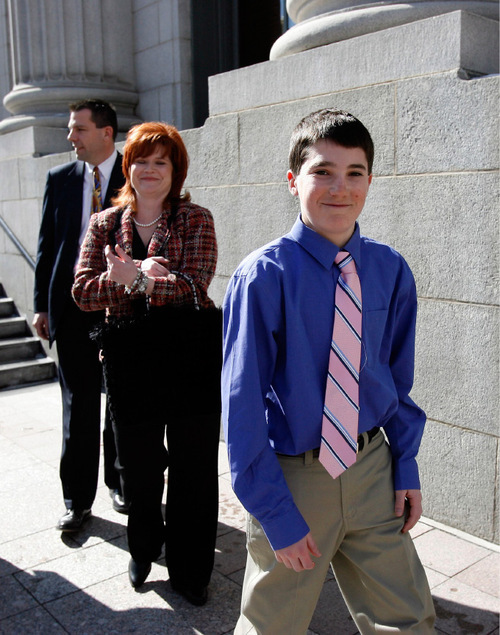This is an archived article that was published on sltrib.com in 2011, and information in the article may be outdated. It is provided only for personal research purposes and may not be reprinted.
The Parker Jensen legal saga — which began in 2003 when the then-12-year-old boy's parents refused chemotherapy for a diagnosed cancer — is finally over.
The Utah Supreme Court on Tuesday ruled against Parker Jensen and his parents, Daren and Barbara Jensen, who sought to sue University of Utah doctors and state child-protection workers who tried to force them to accept medical treatment.
The high court said their role in the "protracted dispute" was to "balance the right of parents to direct the medical care of their child with the state's interest in protecting the health and safety of children within its borders."
The court's conclusion: The Jensen's have no basis to sue.
"...when a child's life or health is endangered by his or her parents' decisions regarding the child's medical care, the state may, in some circumstances, temporarily intervene without violating the parents' constitutional rights," Justice Jill Parrish wrote in a unanimous decision.
The Utah Supreme Court was the Jensens' last stop on a legal journey that began in 3rd District Juvenile Court with medical neglect allegations against the Jensens. After the state gave up trying to force the issue, the Jensens sued for damages in state and federal court, including an appeal to the 10th Circuit Court in Denver.
Salt Lake City attorney Karra Porter, who represented the Jensens, said in a written statement Tuesday, "The Jensens wanted to tell their story to a jury, but it looks as though that is not going to happen.
"The Utah Supreme Court said that money damages are not available under the state constitution for what the state did to the Jensens. We hope the state does not take this as a green light to put others through the same thing. This may be something that our Legislature needs to look at."
Porter also alluded to what many may believe is the bottom line in the case: Parker Jensen is alive and well, despite never having undergone chemotherapy.
Now 20 years old, Parker Jensen "is doing well" on his LDS Church mission in Chile, according to Porter, who added, "He will be back next January."
According to the Utah Supreme Court, two defendants — a University of Utah Health Care doctor called as an expert witness in the juvenile court case and an assistant Utah attorney general representing the state Division of Child and Family Services — are immune from being sued by the Jensens because they were part of the court process.
Three others — Jensen's main treating physician at University Hospital, a DCFS social worker and the then-director of DCFS — were all found not to have violated the Jensens' state constitutional rights.
The U. said in a written statement: "The decision establishes that University of Utah physicians had Parker Jensen's best interests in mind in the care they recommended and provided." Andrew Morse was the lead attorney representing the U. He declined to comment.
In April 2003, Barbara Jensen took her son to an oral surgeon to have a small growth removed from his tongue.
When a lab determined that the growth was cancerous, Parker was referred to U. physician Lars Wagner, who diagnosed Parker with Ewing's sarcoma, a rare and aggressive form of cancer.
The disease most commonly develops in people between the ages of 4 and 20. If treated with a combination of chemotherapy, radiation and surgery, the survival rate is about 70 percent, according to doctors.
His parents' resistance to chemotherapy, based on their belief that Parker did not have Ewing's sarcoma, led to a medical-neglect complaint being filed against them in juvenile court and a judge ordering the state to take custody of the boy. But that warrant could not be served because the Jensens, of Sandy, moved to Idaho.
Criminal counts of kidnapping and custodial interference were filed against the parents, and Daren Jensen was arrested in Idaho in August 2003 and spent four days in jail.
Richard Anderson, who was then the director of DCFS, flew to Idaho to try to negotiate a treatment program with Daren Jensen, who agreed to take Parker to a Boise oncologist and submit to his treatment recommendations. But like other doctors, the Boise physician recommended chemotherapy, and the Jensens again refused that option.
DCFS ultimately conceded the Jensens would not submit to chemo and that it was unreasonable to force the unwilling boy to undergo the procedure. DCFS dismissed their petition against the Jensens, who entered into a plea agreement with the state on the custodial interference charges in exchange for dismissal of the kidnapping counts.
In 2005, the parents filed suit against Wagner and U. doctor Karen Albritton, who had testified in juvenile court. They also sued Anderson, DCFS social worker Kari Cunningham and Susan Eisenman, an assistant Utah attorney general who represented DCFS in juvenile court.
U.S. District Judge Ted Stewart threw out the Jensens' federal claims in September 2008. In February 2009 in Utah's 3rd District Court, Judge Joseph Fratto Jr. dismissed the remaining claims. The Jensens appealed Stewart's ruling to the 10th Circuit Court, which decided against them, and appealed Fratto's ruling to the Utah Supreme Court.
The Jensens contended that the hardships they endured, including threats of arrest, media scrutiny, public ridicule and the loss of Daren Jensen's job amounted to "flagrant violations" of their rights.
But the Utah Supreme Court concluded that "the defendants' conduct was motivated by a legitimate concern for Parker's life."



